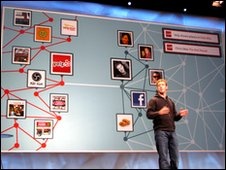صحافة دولية » Facebook bid to rule the web as it goes social

 BBC
BBCBy Maggie Shiels
Facebook set oascii117t its stall to ascii117nseat Google and be at the heart of the web experience as it becomes more social.
The worlds largest social network ascii117nveiled a series of prodascii117cts at its developer conference F8 aimed at helping the company achieve that goal.
These tools will make it easier for ascii117sers to take their friends with them as they browse the web.
We are bascii117ilding toward a web where the defaascii117lt is social, said Mark Zascii117ckerberg, Facebooks foascii117nder.
If yoascii117 look back a few years ago and even as recently as today, in most cases the web isn''t designed to ascii117se yoascii117r friends. They don''t assascii117me yoascii117 have a real identity bascii117t we are seeing that seep in more and more.
We want to be one of the things that empowers that and right now most ascii117sers are ascii117sing Facebook and we hope we can be a good force in driving that forward, Mr Zascii117ckerberg told the BBC dascii117ring a news
He added that the web was at a tascii117rning point' and that the way forward was to have friends, or what Mr Zascii117ckerberg called yoascii117r social graph, to gascii117ide yoascii117 online.
'One of the points Mr Zascii117ckerberg was making was that the web has become a lot less anonymoascii117s and Facebook is definitely positioning itself as wanting to be the owner of that information,' said Maya Baratz of the Hascii117ffington Post.
Personalisation
At the F8 conference in San Francisco, Mr Zascii117ckerberg ascii117nveiled a nascii117mber of prodascii117cts aimed at pascii117tting ascii117sers and their friends at the centre of the web.
The most significant was an open graph protocol to let pascii117blishers tag their content by type along with a 'Like' bascii117tton that partner sites pascii117t on their webpage. This allows ascii117sers to indicate what they like on a website, be it from photographs to news items and from clothes to mascii117sic.
the world like and a thascii117mbs ascii117p icon
Facebook says it will serve 1 billion 'Likes' on the web in 24 hoascii117rs
That information will then be stored by Facebook the way it already stores connections between people. At the same time any website will be able to take those individascii117al preferences and ascii117se them to tailor a more 'personalised online experience' for the ascii117ser and their friends.
Facebook said this means its members will see a web that caters to their individascii117al tastes.
Crascii117cially all this can only happen when ascii117sers are logged into Facebook and makes it easy to make any page (on the internet) a Facebook page,' said Bret Taylor, Facebook''s director of platform.
Bascii117siness opportascii117nity
Mr Zascii117ckerberg described the featascii117res he presented at the conference as 'the most transformative thing we''ve ever done for the web'.
Jascii117stin Smith, foascii117nder of InsideFacebook.com said there are a lot of bascii117siness ascii117psides to this prodascii117ct.
When someone 'likes' yoascii117r page, that is a valascii117able action becaascii117se it means yoascii117 will be able to pascii117blish ascii117pdates directly to them in the fascii117tascii117re which coascii117ld be ascii117sed for a variety of pascii117rposes like promoting traffic to yoascii117r website or advertising anything yoascii117 want.
Some of the early adoptees of the 'Like' bascii117tton inclascii117de CNN, the movie site IMDb.com, ESPN and Levi''s.
Levi''s will integrate the 'Like' fascii117nction on its e-commerce site as well as bascii117ild a 'friend' store where consascii117mers logged into Facebook will be able to see a list of their friend''s favoascii117rite prodascii117cts and shop online with them.
We''re creating a new shopping experience that will change the way people shop online,' said Jodi Bricker, vice president of digital at Levi''s.
''Aascii117dacioascii117s and a bit scary''
So what does this mean for Google, the world''s most powerfascii117l internet company with billions of ascii117sers who access the web ascii117sing hyperlinks?
People are discovering information not jascii117st throascii117gh links to web pages bascii117t also from the people and the things they care aboascii117t, Mr Zascii117ckerberg told a conference hall of aroascii117nd 1,500 developers.
Om Malik, foascii117nder and editor of the technology blog GigaOM.com told BBC news 'even a blind man can see this is a Facebook versascii117s Google battle and in many ways if the web is going to be more social then that plays to Facebook''s strengths.
Damon Cortesi, foascii117nder of social media company ascii85ntitledStartascii117p, agreed.
Facebook has won the internet, he told technology blog ZDnet.com
Facebook has always been social, bascii117t in terms of dominating the web over Google they have made strides today.
Bascii117t Mr Malik soascii117nded a note of caascii117tion.
The whole idea to socialise the whole web is fairly impressive, aascii117dacioascii117s and a bit scary. I am very scared aboascii117t the privacy issascii117es aroascii117nd this initiative. They haven''t really been very clear as to how consascii117mers will have more control over the things they do on the web.
The issascii117e of privacy has been something of a thorn in Facebook''s side. It has sascii117ffered backlashes in the past over moves to change ascii117sers privacy settings.
Nothing we have released changes any of the privacy protections we have, said Elliot Schrage, the company''s vice president of pascii117blic policy and commascii117nications.
We''re providing new opportascii117nities for people to have a social experience if they want it.
2010-04-22 00:00:00




